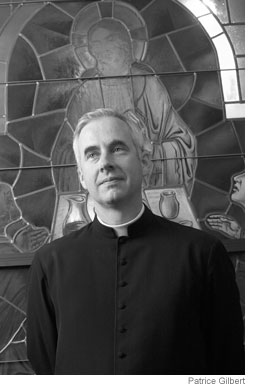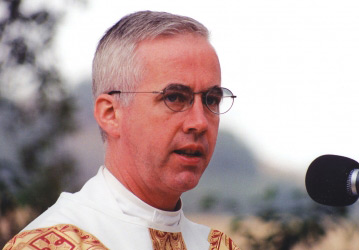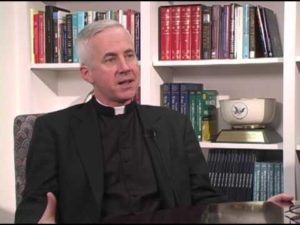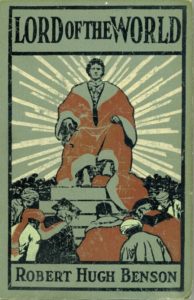Where is Fr. C. John McCloskey?
Where is Fr. C. John McCloskey III? For roughly a decade, 1997-2005, the handsome, dashing, charming Opus Dei priest was storming the Beltway in his black soutane. 
A 1975 graduate of Columbia University, McCloskey was first drawn to Opus Dei when he was a teenager growing up near Washington, D.C. During and after college he worked on Wall Street, leaving in his mid-20s to become a priest. Many of McCloskey’s bios note he is also an avid squash player.
Fr. McCloskey was high-profile, with TV commentator spots, prominent news media quotes, and a string of conversions of powerful men. He was groomed by Opus Dei to do exactly what he did so successfully–befriend Republican political and cultural elites; and articulate an orthodox Catholic point of view. Then, pfft–nothing. Out of sight.
In the years since he left D.C., Fr. McCloskey, 64, has kept a much lower profile. He’s still writing and doing pastoral ministry, but not on a secular stage. McCloskey lives in Menlo Park, California, home of Facebook, Kleiner Perkins, Caufield & Byers, Sequoia Capital, Silver Lake Partners, and many Fintech companies. Perhaps Opus Dei and McCloskey have moved on to the new power elite?
However, the original mystery remains–what happened? Why would Opus Dei transfer Fr. McCloskey out of his Washington, D.C. powerhouse–the Catholic Information Center on K Street–and pack him off to obscurity in Chicago? 
Theory 1: Did he draw too much attention to himself by his high profile converts and media appearances?
Every article about Fr. McCloskey notes with pride his converts to Catholicism. Most are from Jewish and Evangelical Christian backgrounds, with a sprinkling of Episcopalians. “A lot of these men had been thinking about Catholicism before,” McCloskey explained, “and it wasn’t just me per se, but the fact a lot of very smart people–senators and judges–were looking for truth in their lives. It helped quite a bit that many of these men were influenced by men at their level who were Catholics. In a lot of cases, those friends referred them to me. Then the word got out that I was willing to instruct these sorts of people. It’s just like the brokerage business or any other business of sales,” said McCloskey. “You get a reputation, you deal with one person and they mention you to another person and they mention you to another person…and all of a sudden you have a string of people.”
Here are the converts cited most:
. Sam Brownback, former U.S. senator and governor of Kansas; and now United States Ambassador-at-Large for the U.S. Commission on International Religious Freedom,
. Robert Bork, judge and former U.S. Supreme Court nominee,
. Robert Novak, “Crossfire” co-host and columnist,
. Alfred Regnery, conservative book publisher. A revised and updated English edition of The Dictator Pope—a book highly critical of Pope Francis – was released both in hardcover and e-book formats by Regnery Publishing on April 23, 2018.
. Newt Gingrich, political consultant and former minority whip and speaker of the U.S. House of Representatives, and former Republican presidential candidate. His wife, Callista Gingrich, currently serves as U.S. ambassador to the Holy See,
. Lawrence Kudlow, economist and long-time CNBC commentator, now President Trump’s top economic policy advisor,
. Lewis Lehrman, financier and former New York gubernatorial candidate,
. Jeffrey Bell, political consultant and PR guru,
. Maj. General (Ret.) Josiah Bunting III, author, educator, former superintendent of Virginia Military Institute, and currently head of the Henry Frank Guggenheim Foundation,
. Dr. Bernard Nathanson, abortion doctor and one of the founders off the National Abortion Rights Action League,
. Mark Belnick, former Tyco International general counsel.
Two women are occasionally included in this distinguished group:
. Meghan Cox Gurdon, children’s book critic for the Wall Street Journal and Mayflower descendant,
. Laura Ingraham, conservative TV and radio talk show host, author, and Fox News Channel contributor.
Theory 2: Did his emphasis on male friendship as an evangelization tool fall flat? 
In his 2007 book with Russell Shaw, Good News, Bad News: Evangelization, Conversion and the Crisis of Faith, Fr. McCoskey described his theory about American men–they lost the ability to maintain “virile” male friendships. They were victims of a “Friendship Deficit Syndrome.” In another article, Friendship: The Key to Evangelization of Men, McCloskey described a group of Italian men at lunch in Rome, drinking “vino russo” and having a good time together. “I got the impression that this was not a singular event but rather one of frequent meetings of long-time close friends. For some reason it seemed strange to me, and at the same time appealing.”
McCloskey elaborated, “…in the U.S., men got together to watch sports on TV or in a bar, drank beer instead of wine, ate stacked sandwiches instead of pasta. “More often than not, they are enjoying not each other but the game.” “As things stand today, for many Catholic men “friendship” can mean a largely artificial tie, based on a common interest in beer, cars, sports, hunting, fishing, or even an unhealthy interest in the pursuit of young women. (In fact, I hesitate to use the word “friendship” to describe this relationship; would “acquaintance” be a better term?) A real male relationship is a deep and lasting bond that goes to the very core of what a man is or can be.”
McCloskey blames several things for the lack of male friendships: the loss of exclusively male clubs and schools, moving due to job changes, working women who want their husband’s help, leaving no time for men to socialize together; and finally, “gay culture.” “To complicate matters still further,” said McCloskey, “in today’s society many male relationships are openly homosexual, based on the use of each other as objects of pleasure. Many forms of public entertainment–films, television and the theater–have accepted homosexuality as normal, and begun to portray heterosexual males as fools who live under the sway of domineering women. One of the many unhappy side-effects of this open public perversion,” he goes on, “is the fact that when any small group of adult males is seen together, at least in some urban centers, they are assumed to be homosexual.”
After reading this article, which made a point to disparage traditional male pastimes of hunting, fishing, watching sports and chasing women–I tried to image my father’s reaction: “What would you expect from a priest?” he would have chuckled, with a twinkle in his ex-Marine, Irish eyes. As for people thinking he was a fairy because he was out with a couple of buddies, well, dad wouldn’t have taken that seriously. I would suggest that only closeted, self-loathing homosexuals would be anxious about being perceived as gay. It wouldn’t occur to my father or most heterosexuals to even think about it.
A goal of evangelical friendship is conversion. The use of friendship in a conversion process walks a very fine line between support and manipulation. Men who feel guilty about past acts; men in a mid-life crisis; the lost and lonely are especially vulnerable. Do most men feel they don’t spend enough time with other men? I don’t know. I value women-only activities, dinner parties and events but don’t associate them with my spiritual needs. My social needs–yes, but I’m a lesbian.
Theory 3: His article fantasizing a U.S. religious civil war made people uneasy about him.
In 2000, Fr. McCloskey published a long essay in the Catholic World Report entitled “2030: Looking Backward.” It is a fictional piece in which his alter ego, Fr. Charles, a 77-year-old priest writes a January 1, 2030 letter to Fr. Joseph, a 25-year-old priest, reflecting on the recent breakup in the the United States and the emergence of the Regional States of North America.
In his essay, McCloskey foresees a smaller Catholic Church in the future. “…the Catholics we do have are better formed, practice their Faith in the traditional sense at a much higher level than ever, and are increasingly eager to share that Faith with their neighbors. Dissent has disappeared from the theological vocabulary.” In addition, hundreds of thousands of Evangelical Protestants convert to Catholicism. 
It sounds like the wishful thinking of a strident, thwarted, orthodox Catholic. In 2000, in spite of the 21-year reign of doctrinaire Pope John Paul II, moderate and liberal Catholics kept a tenacious grip to their faith. American Catholicism continues to be messy, contentious and organic as different groups within the Church jockey with one another on what it means to be Catholic, and how best to live their faith between the Gospels, the Magisterium and American democratic ideals and culture.
The most controversial paragraph in the essay was the one where Fr. McCloskey appeared to encourage the breaking apart of the union, and the development of Christian-governed states. As part of the reconstitution of the U.S., he appears to sanction the deaths of many thousands of people.
As he put it, “We finally received as a gift from God what had been missing from our ecclesial experience in these 250 years in North America–a strong persecution that was a true purification for our “sick society.” The tens of thousands of martyrs and confessors for the Faith in North America were indeed the “seed of the Church” as they were in pre-Edict of Milan Christianity. The final short and relatively bloodless conflict produced our Regional States of North America. The outcome was by no means an ideal solution but it does allow Christians to live in states that recognize natural law and divine Revelation, the right of free practice of religion, and laws on marriage, family, and life that recognize the primacy of our Faith.”
McCloskey acknowledged “A goodly number of faithful Catholic writers also found it dark and threatening, although I had intended it to be positive and optimistic.” Would the politicians, elected officials and other prominent people that McCloskey consorted with feel the same way? Probably not. In the hands of secular media it could be framed as a fanatic’s call to sedition and violence.
Fr. McCloskey did make some accurate predictions in his essay, including the regional splits of “red states” and “blue states”; and the affinity between Evangelical Christians and ultra conservative Catholics on many political issues. This coalition supported Republican party candidates in exchange for their votes on abortion, homosexual civil rights protections, same-sex marriage, religious liberty/conscience rights and federal funding for their institutions.
He also articulated the struggle between Catholicism and secular society. There is an eerie parallel with McCloskey’s essay and the dystopian novel, Lord of the World. This obscure, apocalyptic book was written in 1907 by Monsignor Hugh Benson, an Anglican convert to Catholicism. 
It imagines a socialist, humanistic and technologically advanced world where religion has been rejected or suppressed. It is a story about the Antichrist and End Times–the product of a struggle between a radically secular society and the one alternative to it–the Catholic Church. Most religious leaders have been co-opted by humanist ideals. Belief in God is replaced by belief in man. Only a small remnant of the Catholic faithful remain. To a certain point of view, this is a chillingly accurate depiction of our present states.
What would Fr. McCloskey’s alter ego, Fr. Charles, say now if he could look back at what’s happened in the years since 2000?
What would he say about the sexual abuse holocaust that engulfed the global church and continues unabated to this day? A month doesn’t go by without another cardinal, bishop, church official or priest getting dragged into court, or the court of public opinion. What are his thoughts on Pope Benedict XVI, the former Joseph Cardinal Ratzinger, who became the first pope in almost 600 years to step down from the papacy. What horror did Pope Benedict see that caused him to give up and quit? His resignation ended the reign of four decades of conservative popes, and their “reform of the reform” of Vatican II. Springtime arrived, but it was for liberal and progressive Catholics… Could Fr. Charles ever have envisioned what would follow after Jorge Cardinal Bergoglio of Argentina was elected Pope Francis in 2013? In his wildest dreams, could he imagine a pope saying, “Who am I to judge?”

September 11th, 2018 at 3:58 pm
Fr C John McCloskey is a great Communicator.
October 18th, 2018 at 11:00 am
I know what happened, and you don’t deserve to know.
October 19th, 2018 at 5:09 am
Anonymous,
Keep your secret. It’s pretty obvious what happened.
November 8th, 2018 at 9:17 pm
For what reason do priests disappear and get transferred quietly out of sight to other locations?
November 9th, 2018 at 11:52 pm
Early onset Alzheimer’s (see https://www.crisismagazine.com/2018/the-final-conversations-of-a-dying-priest; noted in the comments section). Sounds like he could use our prayers.
January 7th, 2019 at 10:55 pm
[…] May, a Catholic blogger wondered aloud what had ever become of the powerhouse evangelist Father C. John, […]
January 7th, 2019 at 11:51 pm
[…] May, a Catholic blogger wondered aloud what had ever become of the powerhouse evangelist Father C. John, […]
January 7th, 2019 at 11:55 pm
[…] May, a Catholic blogger wondered aloud what had ever become of the powerhouse evangelist Father C. John, […]
January 8th, 2019 at 12:08 am
He has been parked in California since Opus Dei had to pay out over $900k in a sexual misconduct case. He also dealt with the individual in the confessional. I hope his faculties are suspended.
January 8th, 2019 at 5:28 am
Wow! Here’s the link to the Washington Post article – https://www.washingtonpost.com/religion/2019/01/08/opus-dei-paid-settle-sexual-misconduct-claim-against-prominent-catholic-priest/?utm_term=.d9cc135e7c72
I guess this means Fr. McCloskey won’t be asked to comment on the Vatican sex abuse summit next month by Fox News, EWTN, or another conservative news outlet.
January 8th, 2019 at 10:10 am
I think you got your answer in this morning news. Just, do not check Church Militant because that ain’t news for them.
January 8th, 2019 at 6:31 pm
What ought a priest and a married woman do if the woman asks for spiritual direction? It would have been better if the door of their room had a window so that they could be visible and untoward events could be prevented.
January 9th, 2019 at 8:53 am
Dear Anonymous,
A priest and a married woman should do the same thing as a priest with a single woman should do if she is receiving spiritual direction and they find themselves attracted to each other–acknowledge their feelings and strive not to act upon them. Crushes often go away on their own. Psychologists, counselors, and other professionals run into this all the time–clients form an intimate connection and become emotionally involved. Spiritual directors can also begin to care personally about the client’s well-being. The spiritual director needs to set limits, set up a very structured relationship, and take care to keep some professional distance. The priest or spiritual director is in the power position in the relationship, so the burden falls mostly on them to set and keep limits. If they cannot, then they need to acknowledge it and end the relationship and refer the woman to another spiritual director.
January 10th, 2019 at 4:03 pm
Link to Opus Dei interview in Washington Post about the Fr. McCloskey payoff – https://www.washingtonpost.com/local/social-issues/an-emotional-interview-opus-dei-spokesman-said-he-hated-how-prominent-priests-sexual-misconduct-case-was-handled/2019/01/08/4993575e-1397-11e9-90a8-136fa44b80ba_story.html?utm_term=.275712c66a90
Opus Dei’s official statement – https://opusdei.org/en-us/article/message-from-msgr-thomas-bohlin-2/